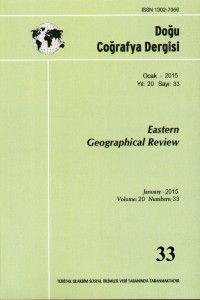Abstract
Labor force is one of the most important actors for Economic Geography. It also plays a very important role for development of countries or regions. However, it has a brittle structure. Labor force occurs and develops in the suitable area. In this sense, labor force demand occurs in the developed regions in Turkey. If labor force demand in Turkey isn’t covered locally, this demand is covered by the migration from different regions. This situation causes to unbalanced distribution of labor force. Labor force in Turkey is concentrated on the western regions, especially Marmara and Aegean Region which have the developed service industry and optimum agrarian opportunities, and are industrialized. Contrarily,east and northeast of Turkey where natural conditions are not suitable for the development of the region have less labor force concentration. It can be understood from OECD report (2012) that Turkey is not at a good situation in terms of the number of the labor force and participation rate of labor force. Because Turkey is one of the countries having the lowest values, it is clear that there are so many problems to solve. In order to work out the targets for development both regionally and globally, Turkey has to give the importance to regional development and also supply and demand of labor force
Keywords
References
- Aysıt, T., 2012, 2050’ye Doğru Nüfusbilim ve Yönetim: İşgücü Piyasasına Bakış, Türk Sanayicileri ve İşadamları Derneği, Yayın No: TÜSİAD-T/2012-11/536, İstanbul.
- Bakırcı, M., 2007, Türkiye’de Kırsal Kalkınma; Kavramlar-Politikalar-Uygulamalar, Nobel Yayın Dağıtım, Ankara.
- Doğanay, H., 2011, Türkiye Ekonomik Coğrafyası, Pegem Akademi, Ankara.
- Eren, A., 2006, Türkiye Ekonomisi, Ekin Kitapevi, Ankara.
- Güngördü, E., 2011, Üniversiteler İçin Türkiye’nin Beşeri ve Ekonomik Yapısı, Nobel Yayınları, Ankara.
- Gürsel, S., Levent H.,Taştı, E., ve Ark. 2002, Türkiye’de İşgücü Piyasası ve İşsizlik, Türk Sanayicileri ve İşadamları Derneği, Yayın No:TÜSİAD-T/2002/12-354, İstanbul.
- İLO Global Employment 2012
- OECD Employment Outlook 2012.
- Nichols, T., ve Sugur, N., 2004, Global Management, Local Labour, Turkish Workers and Industry, Palgrave Macmillan, New York.
- Murat, S., 2007,Dünden Bugüne İstanbul’un İşgücü ve İstihdam Yapısı, İstanbul Ticaret Odası Yayın No: 2007-73, İstanbul.
- TÜİK, İşgücü Göstergeleri, 2011-2012
- Tümertekin, E., Özgüç, N., 2012, Ekonomik Coğrafya; Küreselleşme ve Kalkınma, Çantay Kitapevi, İstanbul.
- TÜSİAD Ekonomik Araştırmalar Bölümü, 2011, Türkiye Ekonomisi 2012, Yayın No: TÜSİAD-T/2011-12/525, İstanbul.
Abstract
Ekonomik coğrafyanın en önemli aktörlerinden biri işgücüdür. Ülkelerin veya bölgelerin kalkınmasında çok önemli rol oynarlar. Ancak çok kırılgan bir yapıya sahiptir. İşgücü, kendine imkan bulduğu alanda bulunur ve gelişir. Bu açıdan bakıldığında Türkiye’de kalkınmış bölgelerde işgücü talebi olmaktadır. Türkiye’de işgücü, talepleri yerel kaynaklardan karşılanmadığı durumlarda, farklı bölgelerden göç alarak bu eksikliği karşılamıştır. Bu durum işgücünün bölgeler arası farklı dağılış göstermesine neden olmaktadır. Türkiye’de kalifiye işgücü daha çok batı kesimlerde özellikle Marmara ve Ege gibi sanayileşmiş, tarım olanakları optimum imkanlar sunan ve hizmetler sektörü gelişmişlik arz eden kesimlerde yoğun bir dağılış göstermektedir. Buna karşın çevre şartları gelişmeye elverişli olmayan Türkiye’nin doğu ve kuzey doğu kesimleri, daha az yoğunluk göstermektedir. Türkiye, işgücü ve işgücünün işe katılım oranları açısından OECD ülkeleriyle karşılaştırıldığında iyi bir durumda olmadığı görülmektedir. Sözü edilen ülkeler arasında sondan ikinci sırada oluşu bu konuda yapılacak çok işler olduğunu göstermektedir. Türkiye, gerek dünyada gerekse bölgede kalkınmışlık hedeflerini gerçekleştirmek istiyorsa, bölgesel kalkınmaya dolayısıyla işgücü arz ve taleplerine önem vermelidir.
Keywords
References
- Aysıt, T., 2012, 2050’ye Doğru Nüfusbilim ve Yönetim: İşgücü Piyasasına Bakış, Türk Sanayicileri ve İşadamları Derneği, Yayın No: TÜSİAD-T/2012-11/536, İstanbul.
- Bakırcı, M., 2007, Türkiye’de Kırsal Kalkınma; Kavramlar-Politikalar-Uygulamalar, Nobel Yayın Dağıtım, Ankara.
- Doğanay, H., 2011, Türkiye Ekonomik Coğrafyası, Pegem Akademi, Ankara.
- Eren, A., 2006, Türkiye Ekonomisi, Ekin Kitapevi, Ankara.
- Güngördü, E., 2011, Üniversiteler İçin Türkiye’nin Beşeri ve Ekonomik Yapısı, Nobel Yayınları, Ankara.
- Gürsel, S., Levent H.,Taştı, E., ve Ark. 2002, Türkiye’de İşgücü Piyasası ve İşsizlik, Türk Sanayicileri ve İşadamları Derneği, Yayın No:TÜSİAD-T/2002/12-354, İstanbul.
- İLO Global Employment 2012
- OECD Employment Outlook 2012.
- Nichols, T., ve Sugur, N., 2004, Global Management, Local Labour, Turkish Workers and Industry, Palgrave Macmillan, New York.
- Murat, S., 2007,Dünden Bugüne İstanbul’un İşgücü ve İstihdam Yapısı, İstanbul Ticaret Odası Yayın No: 2007-73, İstanbul.
- TÜİK, İşgücü Göstergeleri, 2011-2012
- Tümertekin, E., Özgüç, N., 2012, Ekonomik Coğrafya; Küreselleşme ve Kalkınma, Çantay Kitapevi, İstanbul.
- TÜSİAD Ekonomik Araştırmalar Bölümü, 2011, Türkiye Ekonomisi 2012, Yayın No: TÜSİAD-T/2011-12/525, İstanbul.
Details
| Primary Language | Turkish |
|---|---|
| Journal Section | RESEARCH ARTICLES |
| Authors | |
| Publication Date | January 26, 2015 |
| Submission Date | June 24, 2014 |
| Published in Issue | Year 2015 Volume: 20 Issue: 33 |
Cited By
Job satisfaction of farm advisors working through an immature farm advisory system
Environment, Development and Sustainability
https://doi.org/10.1007/s10668-023-03913-7
Türkiye İstihdam Piyasası Yapısal Özellikleri ve Bölgesel Farkları Üzerine Mekansal Bir Yaklaşım
Cankiri Karatekin Universitesi Iktisadi ve Idari Bilimler Fakultesi Dergisi
https://doi.org/10.18074/ckuiibfd.728368
Content of this journal is licensed under a Creative Commons Attribution NonCommercial 4.0 International License


